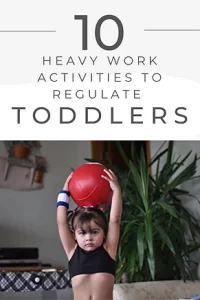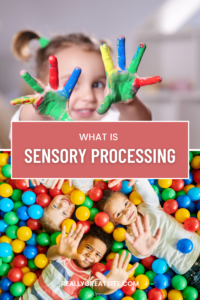
7 Empowering things to know about early intervention services
If you are new to early intervention services, it can be a bit intimidating. Maybe you are a parent of a young child and are considering if this is the next right step. This helpful guide will empower you to make the best decisions for your child and your family.

If you are a parent of a young child and have some questions or concerns about your child’s development you may have heard of early intervention services.
Or, maybe it was brought up by your pediatrician at your child’s last doctors visit. If you are feeling a little overwhelmed, or you would just like to learn more about early intervention services, I’m here to help.
Hi! My name is Marra and I am a mom of a sweet toddler and a pediatric occupational therapist. I’ve spent years working with children or all ages with different developmental needs and support their families as they navigate the ups and downs of child development.
I have worked in many different settings and by far, the setting I loved the most is Early Intervention. I truly enjoyed working with the little ones and their parents and being a support system for so many beautiful families.
This post is all about the process of early intervention services with the hope of empowering and supporting you along your journey.
7 EMPOWERING THINGS TO KNOW ABOUT EARLY INTERVENTION SERVICES
1. What are Early Intervention Services
First, It’s important to understand more about what early intervention is and how it can help you and your family. Early intervention services is a nationwide program that provides therapy services to children ages birth to three years old and their families who meet the qualifying criteria.
It is managed at the state level, which means it is run a little differently state to state. However it is nation wide and ensures that every child ages birth to 3 years old is provided with needed therapy services regardless of their location or family’s income. It might differ slightly state by state but there is usually a sliding pay scale based on family income and insurance.
Early intervention services take a holistic prospect of child development and family dynamic that emphasizes the critical importance of the early years of child development. It knows the crucial role that the child’s family and environment place in their developmental progression.
Early intervention services take place in the child’s natural environment or wherever they are spending their time. For little ones this is most often their home, daycare, maybe grandparents or families house, or maybe a combination of these places. Where your child’s therapy takes place is determined by the family and therapist.
Evidence supports the benefit of young children participating in therapy in their natural environment.

2. Why Early Intervention services are only for children ages birth to 3
So why the ages of birth to 3 years? Why does early intervention services only apply to this age group? Well there are a couple of answers to this question. The first is that nation wide, children of all ages who qualify for therapy services are provided with the opportunity. This is done through school systems.
You can have you child’s developmental skills evaluated through their school and set up an IEP (Individualized Education Program) to make sure they receive the services they need. Every child across the country has a right to this regardless of their background, or family’s financial situation. Therapy services are available to qualifying children from preschool all the way through highschool.
This leaves us with the children who are too young to attend preschool. The average age that children can begin preschool is 3-years old and so this is why early intervention services are provided to the age group of birth to 3 years.
There is even a more important reason early intervention services are provided to this age group. The first few years of life are the most critical years of child development and they have the potential to impact the rest of their lives. Yes, this might seem like an exaggeration, but it’s true.
The reason for this is because the brain changes more in the first few years of life than it does in the next 90 years. Crazy, right? I love learning about early neurodevelopment! But, maybe that’s just me….I’m a bit of a nerd.
Neuroplasticity is the brain’s ability to change, adapt, recover, or learn new skills. It was once believed that our brains only have neuroplasticity when we are young. This is where the saying “you can’t teach an old dog new tricks”. We now know this is not true and we always have some neuropladsticity capabilities.
That being said, neuroplasticity is the strongest during the first few years of life. The ages of birth to 3 years are the most impactful time to provide therapy services. The early you start, the grater the outcome.
As I mentioned before, early intervention services was my favorite setting to practice in and this is why. The little ones I treated progressed at a faster rate than the older kids I worked with. This doesn’t mean that therapy services aren’t amazingly powerful at any age, all this means is that the earlier you can start therapy for your child the better. This is why providing therapy through early intervention services for children ages birth to 3 years are so powerful.

3. trust yourself! You, as the parent, You hold the power
This next point is so important and something I’m very passionate about. One of my favorite parts about my job is empowering parents to trust themselves, their own incredible strengths as a parent, and being a strong advocate for their child.
It is so important to trust your gut and intuition as you navigate early intervention services, or just the ups and downs of child development in general. If you have any concerns or questions about your child’s development, go ahead and reach out to you local early intervention service coordinator. Who cares what your family, friends, or even your pedestrian may think.
Please remember that no one knows your child better than you and you are the expert of your child. I’m going to say that one more time because it is so dang important to remember. No one knows your child better than you and you are the expert of your child.
If your child doesn’t need services, they won’t qualify (will talk more about this later on). So who cares? At least you’ll get your questions answered and a nice overview of how your child is doing from a developmental perspective.
If they do qualify for early intervention services then you can seek out the therapies that they need and this will only support their development. There is no harm at all! If you have any concerns just go for it! It truly can only help.
Most parents don’t know this but you do not need a referral by a pediatrician for early intervention services. A parent or even a caregiver or close friend can refer you. You as the parent hold all of the power so trust your gut!
- The power you hold as the parent continues throughout the early intervention process and even beyond. I’ve listed some things you as the parent have the right to do below that you might not initially think about:
- Refer your child to early intervention services
- Request a specific evaluation
- Request to change service coordinators
- Request to change therapists
- Request to increase services
- Request to decrease therapy services
- End therapy services at anytime
I like to remind parents that everything is just a recommendation and you hold the power to take action. Even if you get an early intervention eval and your child qualifies for therapy services, it’s just a recommendation, and you as the parent decide whether or not to participate in therapy services.
When your child start therapy services your therapist will make recommendations and suggestions of activities or strategies to implement at home to support your child’s developmental progression and you have the power to do so, or say “that really won’t work for my family and our routine, can we brainstorm alternative strategies”.
Early intervention takes a team approach and you are the leader! Remember no one knows your child better than you.

4. Developmental delays and qualifying for early intervention services
Ok, now let’s dive a little deeper into developmental delays and qualifications. Yes, children develop at all different rates and every child’s developmental trajectory is beautiful AND they might benefit from some support. Early intervention services can provide children with support for the amazing things they are already doing.
I think this is a misconception of early intervention services or therapy services in general. It can have a negative rep and that there is something wrong with a child who needs it or they are not doing what they are supposed to be doing at their age. Honestly, that’s a huge pile of crap!
Every child has their own unique developmental path AND may benefit from support along the way. Early intervention services do not aim to fix a problem but support a child and family where they are.
There is a range that a child qualifies for early intervention services. It is typically a 20% delay, however this might differ slightly state by state. This means that in order to qualify for early intervention services, a child needs to present with a 20% delay in one area of development when compared to statistical norms for that age group.
The areas of development include gross motor skills, fine motor skills, expressive and receptive language, cognitive, sensory processing, social emotional, and self-help skills (feeding is in the self-help group).
However, there can be exceptions to this. If your child has demonstrated typical development and has met the appropriate milestones, however there are sensory or behavior challenges or parenting is really challenging, you can also qualify for early intervention services for your child and your family.
Early intervention services not only supports your child but your family as a whole. So if you have any concerns at all, just go a head and reach out. It can only help.
5. Early Intervention Therapies
Ok, now that we have a better understanding of how early intervention services can support development let’s look at the different therapies that are offered. Each of the therapies have a different approach but it’s important to note that there is definitely overlap as each therapist on the team is targeting an over arching goal that is developed by the family and the therapists.
Occupational Therapy: Occupational therapy is a holistic, client-centered therapy that aims to increase participation in the activities that are meaningful to the child and their family. In early intervention, occupational therapist look at the child’s participation in age appropriate play and daily activities such as eating, bathtime, getting dressed, and sleep. They also target fine motor development or how the child uses their hands to interact with objects within their environment, and sensory processing. If you would like to learn more about sensory processing check out the post linked below.


Speech Therapy: Speech therapy addresses a child’s expressive and language skills and how they are communicating. While the child is continuing to develop their language skills, speech therapists collaborate with the family to develop strategies for the child to communicate their needs Speech therapists can also address cognitive skills and feeding.
Physical Therapy: Physical therapists look at a child’ gross motor skills, or how they use their big muscles to move around the environment. In therapy, physical therapist may target goals such as sitting unsupported, walking, as well as a child’s strength, balance, and coordination.
Developmental Therapy: Developmental therapy is a global therapy that looks at the child’s overall development. They might make recommendations to add another service to the team. They typically target a child’s cognitive and play skills.
Social Work: Social workers are great additions to the early intervention team and addresses the emotional needs of the child and the family as a whole. They can target any behavior challenges of the child and support the parents by providing them with valuable resources.
If your child does qualify for early intervention services the team may recommend one or multiple therapy services. Just remember in the end, you get to make the decision about what is best for your child and your family.
6. Early Intervention Initial evaluation and results
I’ll admit, the early intervention initial evaluation can be a little overwhelming, however I hope to offer you some idea of what to expect to hopefully make it a little easier. The way the initial evaluation is set up might vary state to state. The service coordinator is the first person you will most likely talk to and they will ask what your initial concerns are.
From there, they will reach out to the related therapists and schedule the initial evaluation. You should know that the therapists who will evaluate your child are specialists. Not only do they have their specific license, but they also go through early intervention training and then are certified as initial evaluators which requires years of experience and additional training.
So you might be scheduled for a team evaluation where multiple therapists evaluate the child at the same time or they may come do the evaluation individually. Honestly, I like the team approach because it is one-and-done! This way, you don’t have to repeat yourself over and over.
Every therapist is going to want to know your child’s background info, medical history, and your concerns. I think it’s easier for the family and the child if it’s a team approach to the initial evaluation.
The majority of the early intervention initial evaluation is going to be questions for you. It’s a lot of questions. The therapist want to gain a holistic picture of your child’s development so they will ask questions related to pregnancy, birth, developmental milestones, who lives with the child, daily routine, your concerns, and your child’s likes and dislikes.
They will also ask about different skills or tasks your child does at home. The evaluation is a lot or parent-report so don’t feel like your child needs to be at their best or preform during the evaluation.
The team will most likely do some assessment on your child. Fear not! It’s all play-based. Depending on the age of the child this may include coloring, stacking blocks, playing catch, asking questions, following directions, and observing the child move around their environment.
Remember that these therapist choose to work with little children because we love this young age. I’ve worked with so many therapists and all of them have been kind, gentle and fun. Plus we always have toys on us!
Depending on the set up of the evaluation, you may get a brief overview of the evaluation results that day as well as the therapists recommendations. If so, then everyone as a team will discuss the frequency of therapy as well as IFSP goals.
IFSP stands for Individualized Family Service Plan. It’s like an IEP for school. Notice how it says FAMILY. This is because we know that the well -being of the family is so important in these early years and is directly related to the well-being of the child. So the team will develop IFSP goals at this time.
Recommendations of early intervention services can range from once a week to once a month. If your child does not qualify for services the team might recommend a re-eval in 3 months if you still have concerns
Remember that you are the leader of the team and your voice is the most important. It’s critical that you add to this discussion because the therapists are the experts in their discipline but only you are the expert of your child and your family.
You will not get the final evaluation of the report that day because the therapists need time to score the assessments and write up the evaluation. It will most likely be mailed to you by the service coordinator. I recommend reading through it and writing down any questions you have and having it at your first therapy appointment so you can ask the therapists any questions you have.

7. Early Intervention Therapy
After your child has their initial assessment and you have received the report, if recommended, the next step is to start therapy services. Remember from our previous discussion that early intervention services take place in your child’s environment. This may be your home, daycare, or wherever your child is during the day. You and your therapist can coordinate the best time and location for your child’s therapy.
Similar to the early intervention initial evaluation, your child’s therapy will be play-based. I know that when if I can connect with a child and they enjoy our therapy sessions together, then we are going to make progress so much faster.
As an early intervention therapist, my goal during the first few therapy sessions is to connect with the family and to build a connection with the child so that they trust that I am a fun and safe person. I bring in new toys, play, and let the child know that I respect them.
Once I have established a safe space for the child, I can then begin challenging them more while still engaging in play. Early intervention therapists are geniuses at disguising therapy as play!
Now remember how I mentioned before how early intervention services are for the family too? Yes, we are here to support the family and that continues throughout therapy.
I hate to break it to you but infants and toddlers don’t give a crap about our schedules or care when their therapy sessions take place. I can’t tell you how many times I’ve shown up to a house and the child is asleep.
No problem at all! I still go in and talk with the parents and caregivers. We discuss how the past week was, any new things their child is doing, and collaborate on strategies to help with challenging behaviors or activities to do the following week to help the child continue to progress during their goal.
Parent engagement is a game changer in early intervention services!
To access more information about early intervention services or locate your state program check out the info page on CDC
